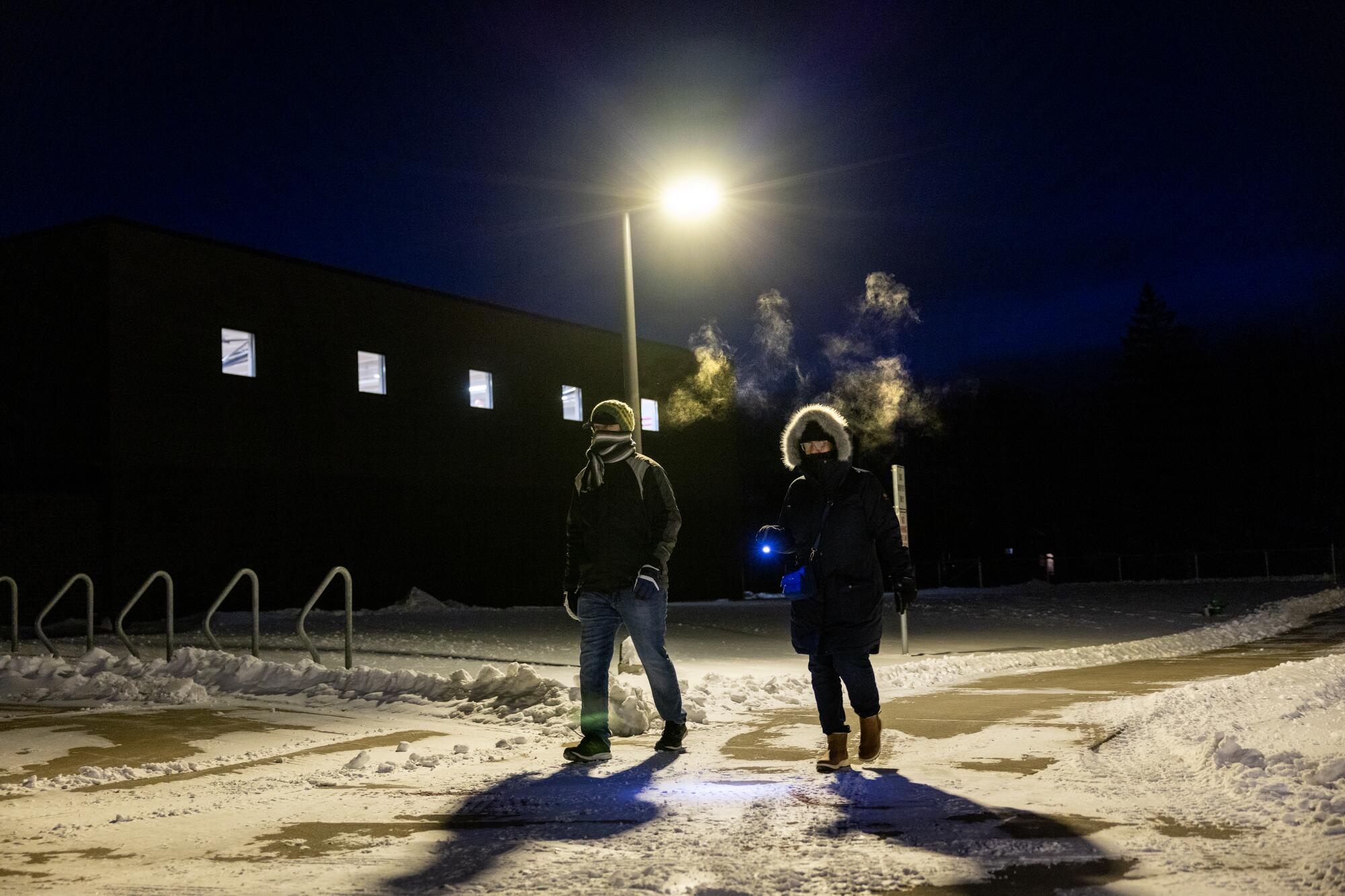
- Share via
AMES, Iowa — The Californians pulled on hats, gloves, scarves and puffy winter coats. Michael Porter covered his face in a warm balaclava and his wife, Natalia, stepped into the boots she had just purchased at Costco. Their 28-year-old daughter, Deborah Stoner, pulled a neon orange Ron DeSantis T-shirt over her head and popped on a matching “DeSantis Precinct Captain” hat. Her husband, Jonathan, wrapped a scarf around his head.
Then they pushed their way out the front door, their breath making puffs in the frigid winter air.
It was Iowa caucuses night for the California family.
Raised in Huntington Beach, Deborah has served in various roles in Iowa Republican politics since moving here with her Lakewood-raised husband in 2017.
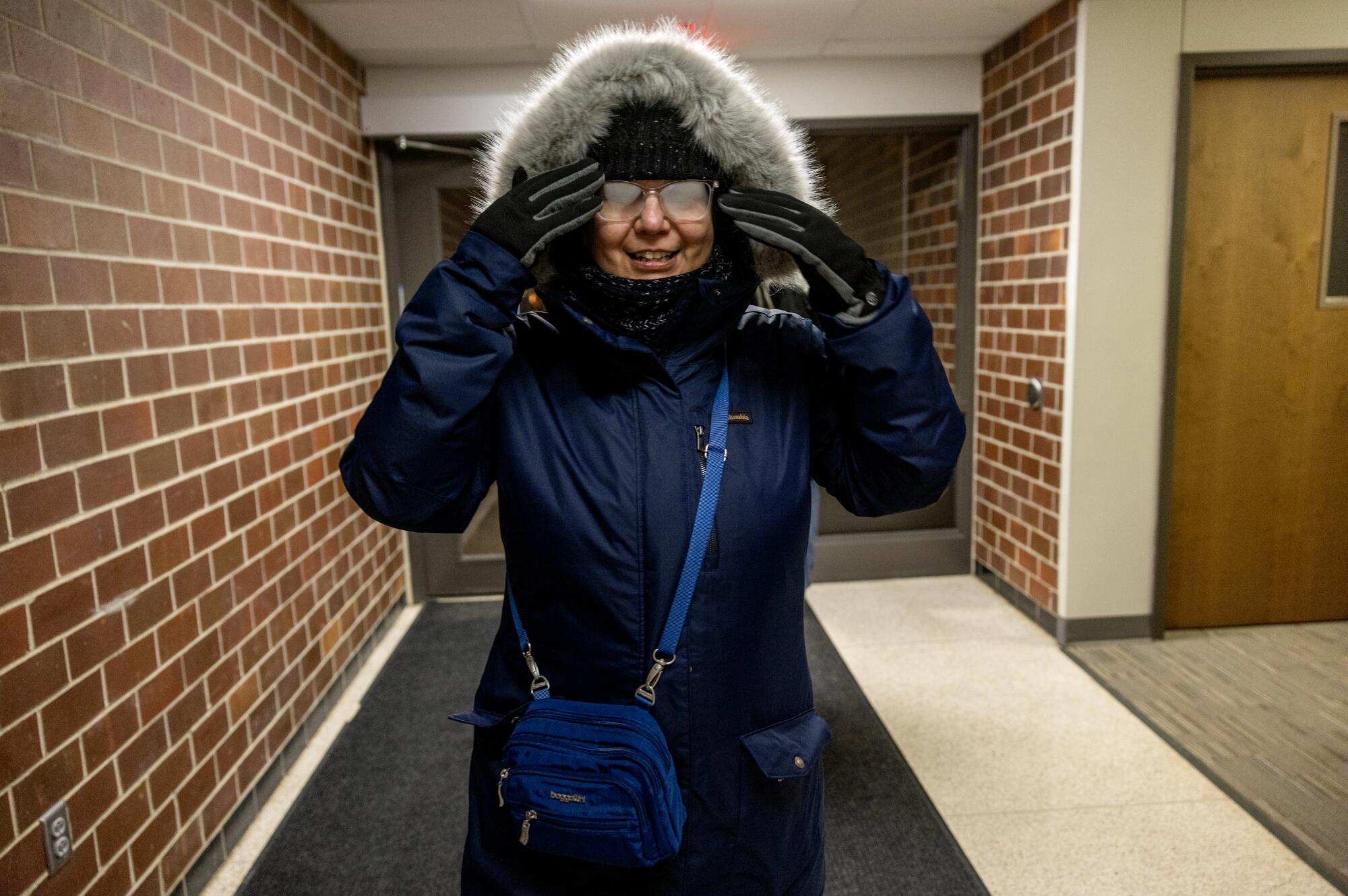
This year, she was precinct captain for DeSantis, the Florida governor. And for Monday’s caucus, she had a special audience: Natalia and Michael, Deborah’s parents, had flown from Southern California to Iowa especially for the first-in-the-nation nominating contest.
Longtime Republicans, the couple switched their registration to no party preference in 2016, when Trump became the GOP nominee.
Unless they flip back, they won’t be able to vote in California’s crucial March 5 Republican presidential primary.
By playing host to her parents, Deborah was giving them a chance to participate in the presidential nomination contest a different way. They could witness the inner workings of Iowa’s caucus process, get a closer look at the GOP candidates and their supporters, and think about how they might vote in November.
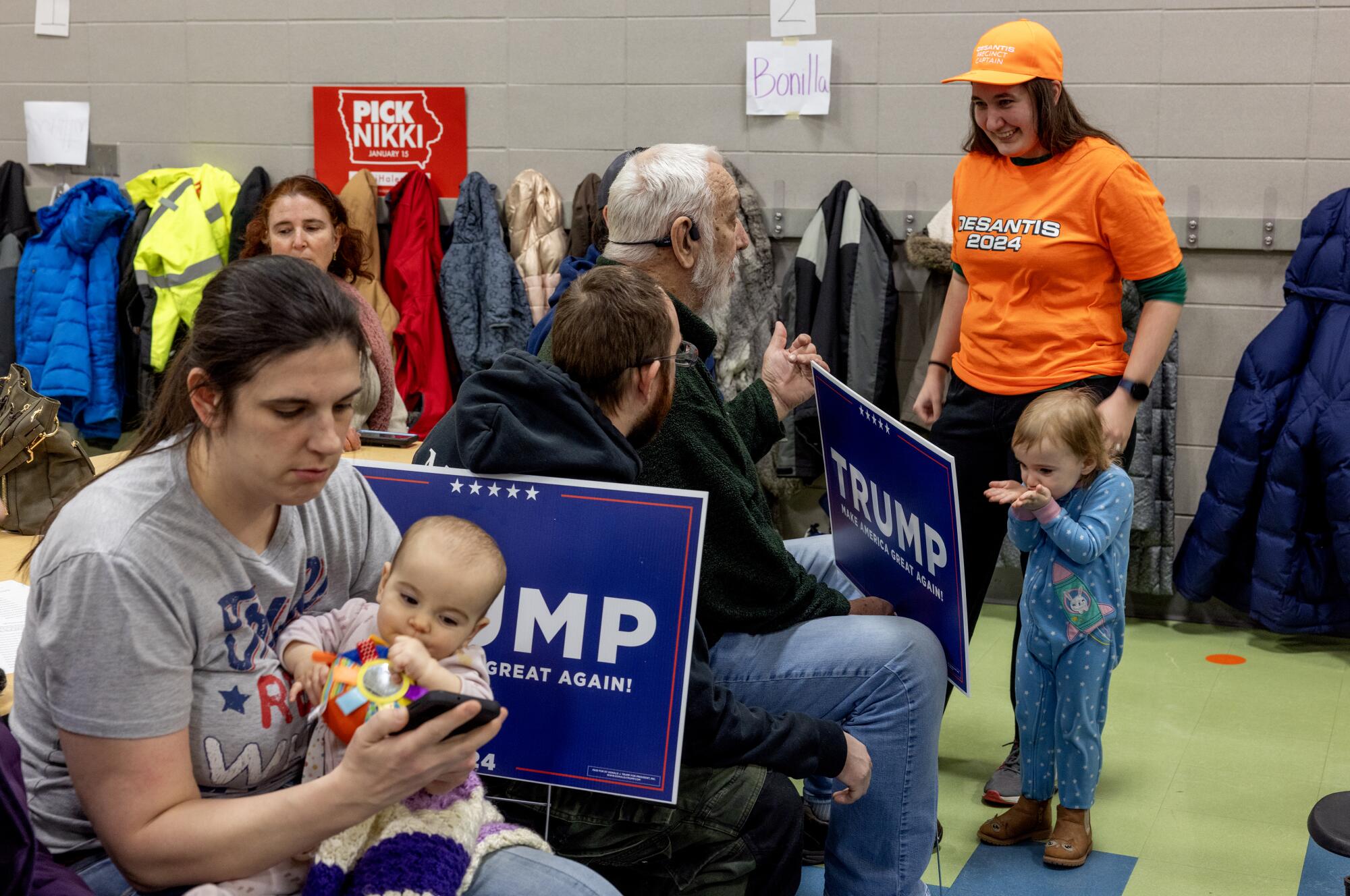
Natalia refused to vote for Trump in 2016, instead opting for independent candidate Evan McMullin. Michael voted for Hillary Clinton. They “didn’t believe Trump was going to do what he said,” Natalia explained. They were pleasantly surprised by Trump’s performance, and they both voted for him in 2020. But they believe the Republican Party used California only for fundraising, so they’re sticking with their NPP registrations.
In the few days since arriving in the frigid state, where temperatures have hovered well below zero, Natalia and Michael had already made the rounds — they saw DeSantis, as well as former South Carolina Gov. Nikki Haley and businessman Vivek Ramaswamy at barbecue restaurants over the weekend. Michael, a soft-spoken math professor at Cal State Long Beach, got to meet a presidential candidate for the first time since Bill Clinton visited Irvine in the early ‘90s.
“It was surreal,” he said. “I’m used to always seeing them on TV, and then, yeah, to actually see a real presidential candidate just a few yards away from me.”
“I love learning about how our country works in all sorts of different ways,” Natalia said.
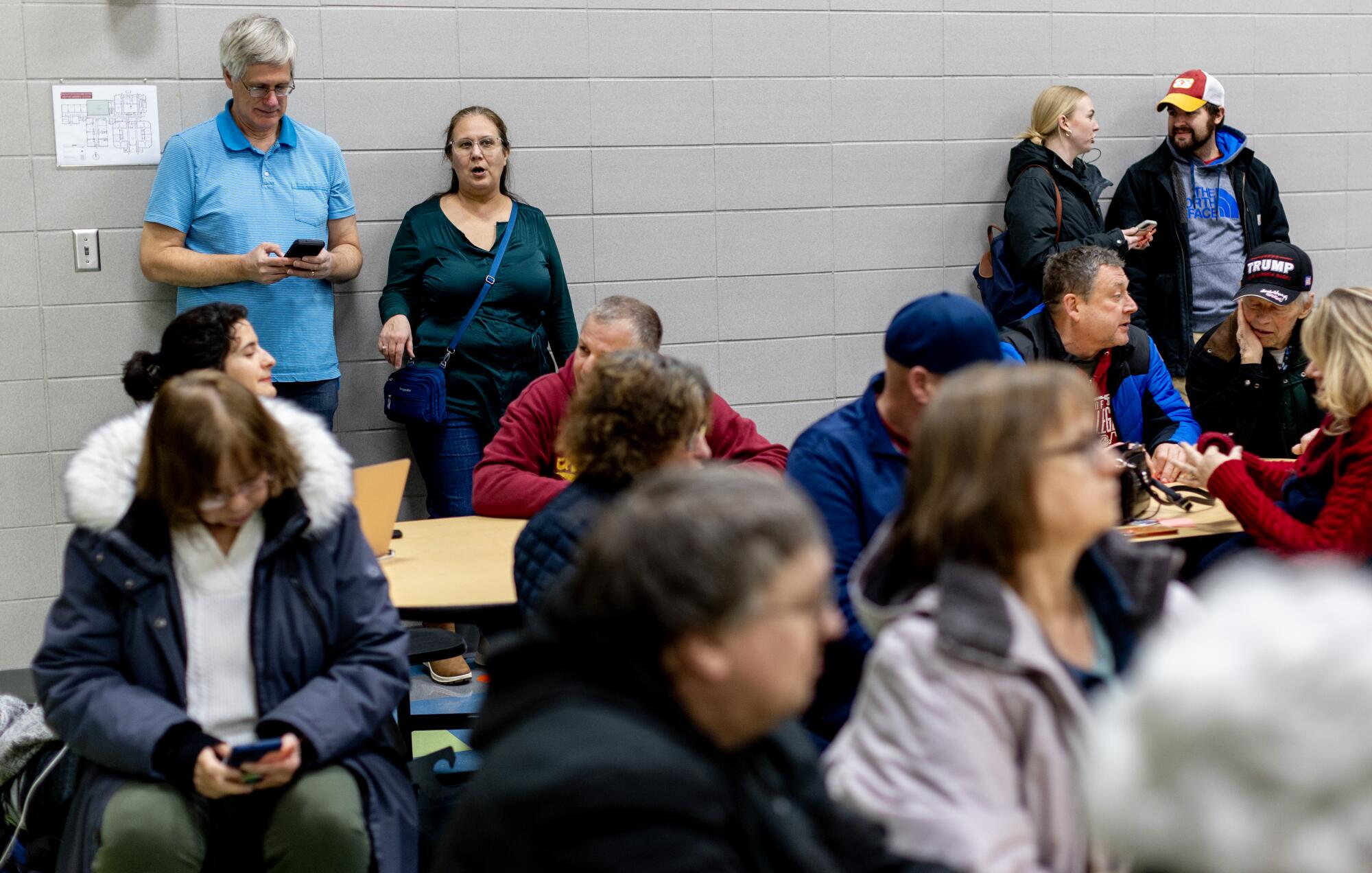
Michael and Natalia raised their two children in a conservative Christian home where dinnertime was revered and foul language was not tolerated. For civic education, Natalia towed her home-schooled children around Orange County suburbs, door knocking for local Republican candidates. She and Michael each took a child into the voting booth on election day, to help them bubble in their vote on the ballot.
Deborah jokes she got an early start in politicking when her mom took her to a George W. Bush election rally. Natalia remembers standing on sizzling asphalt in Garden Grove, taking turns holding up Deborah and Mike Jr. so they could see the stage.
“I was like, ‘We’re hoping this is our next president!’” Natalia recalls.
But Iowa’s first-in-the-nation election procedure is famously opaque, even for political junkies like Natalia and Michael.
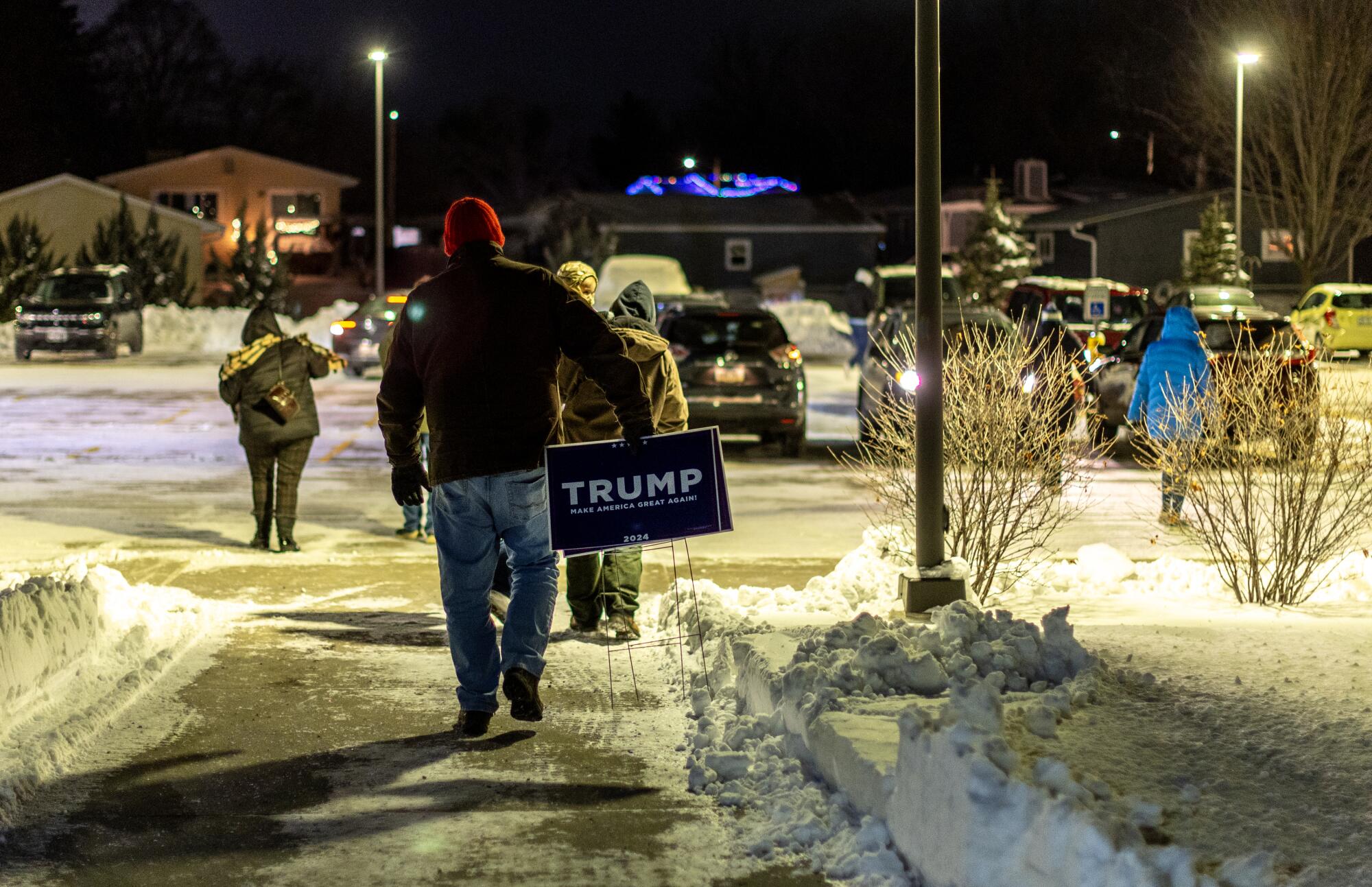
“We read stuff and we’re like, OK, this makes no sense,” Natalia said. “It will be completely foreign to us.”
The caucuses slip by unnoticed for many Americans, who are still awakening to the 2024 election cycle. In Huntington Beach, Mike Jr., 30, a diagnostic tools manager for an original equipment manufacturer, said if it weren’t for his parents’ special trip to Iowa for the caucuses, he’d “have no idea they were existing.”
“People really need to know the candidates, and what they stand for and what they believe in, and make informed decisions on election day, rather than knowing about a candidate and how they did in Iowa,” he said.
Politics isn’t as high a priority for him nowadays — especially after becoming a father eight months ago. Although he still votes and bats around policy issues with his parents and sister, Mike Jr. is “not a politics nerd.” A registered Republican, he’s waiting until California’s primary election day on March 5 draws closer to decide how he’s voting. And how a candidate shifts on policy positions is more important to him than how they perform in Iowa.
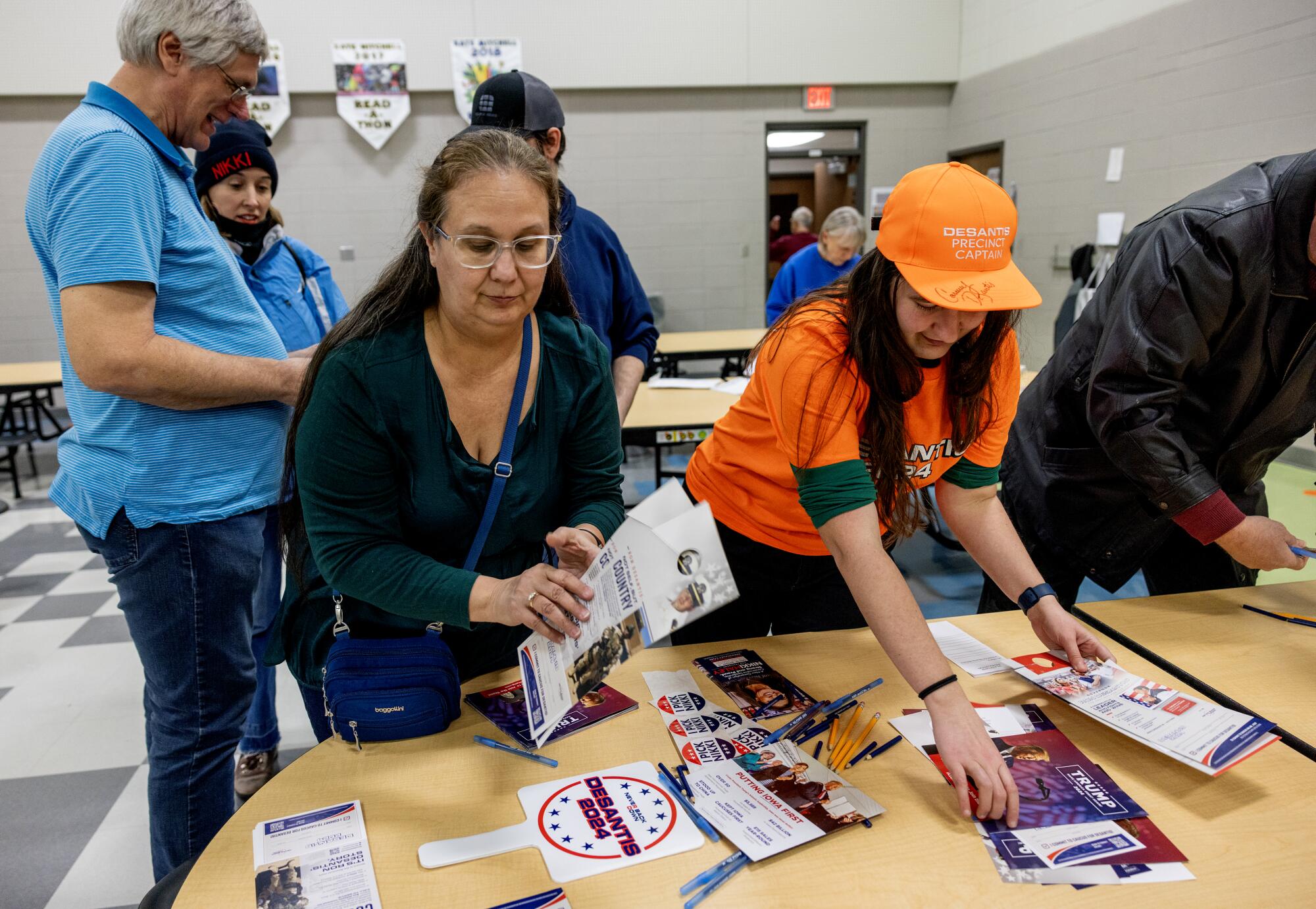
“For me as an individual in California, 2,000 miles away, I kinda already know who the front-runners are, and I know the people who I think are gonna show up on our ballot,” he said. “I’m more focused on the information I need rather than a process in politics.”
On Monday night, Mike Jr.’s parents were all about the process. They trooped into the elementary school caucus location and wiped the fog from their glasses as Jonathan handed his ID to the precinct officials and Deborah set down her box of DeSantis fans, fliers and mailers to do the same. “We’re just observing, we’re from California,” Natalia told caucus chair Roman Lynch.
“Oh! My condolences,” Lynch responded, and they both laughed.
“Seriously! Except I think we’ve got you beat on this weather,” Natalia said.
Once Deborah and Jonathan had signed in, they moved into the cafeteria, where coat hooks lined the walls and a dozen children’s tables soon began to fill with voters.
The 100,000 or so Republican caucusgoers Monday night represented a fraction of Iowa’s 2.2 million registered voters. And Iowa, as the 32nd-most populated state in the union, is a sliver of the overall American electorate.
Should such a small state with a largely homogeneous population — most of Iowa is white, rural and conservative — garner such attention for its first-in-the-nation status?
“There has to be an order,” Natalia said, shrugging. “Somebody’s got to be first. Right?”
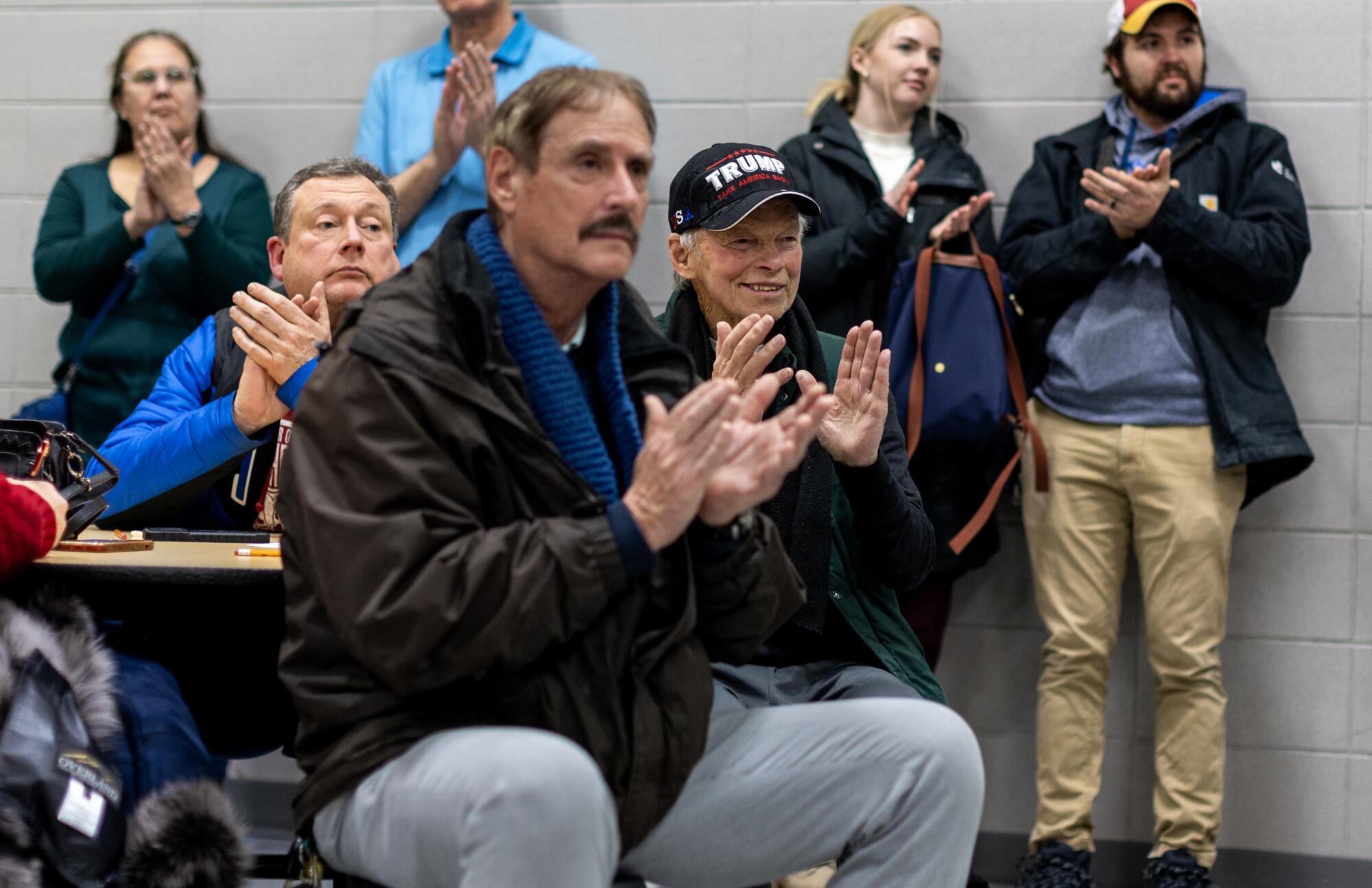
“We’re narrowing the field, and that’s our job,” Deborah added. “It’s hard to win Iowa. And if you don’t show up, you don’t get a lot of traction, in my opinion. Because Iowa is personal politics, where you meet your candidates, you know who they are — including the presidential ones.”
Deborah delights in the candidate tour through Iowa every four years. She’s made a game of collecting campaign mailers and recording who sent them, what they’re about and whether they are for or against a candidate. The stack on her kitchen counter is a couple of inches high.
As caucusgoers began to filter into the elementary school cafeteria, Deborah worked the crowd, greeting familiar faces from her neighborhood and church, and giving one last pitch for DeSantis. At 7 p.m. sharp, the event kicked off.
One by one, representatives for each presidential candidate stood up to give a stump speech. Deborah bopped from the cafeteria to another schoolroom, where another precinct was sharing the space. Sporting her neon orange, she petitioned her neighbors to support DeSantis.
“It’s very much of a different perspective and approach to politics,” Deborah said in an interview before caucus night. “We are the first in the nation, and we have responsibility. And talking to people about politics is important to people.”
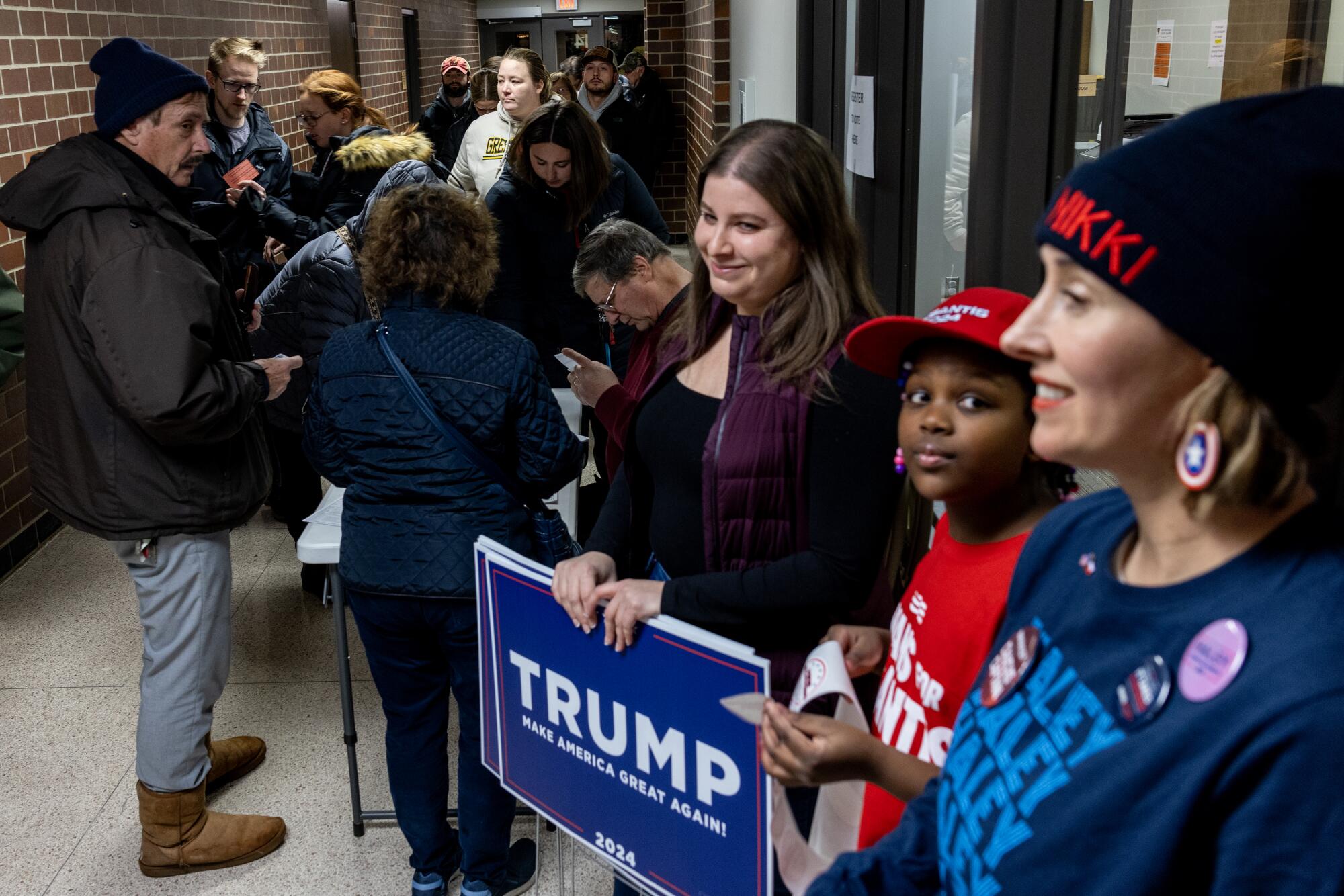
When Deborah left her parents’ home in right-leaning Huntington Beach to study biological systems engineering at the famously leftist UC Davis, she immediately searched for like-minded students. She began volunteering with College Republicans and writing about conservative issues for a now-defunct newspaper, the Millennial Review.
Because Democrats dominate California politics, “You’re definitely a lot more free in California to vote how you feel,” Deborah said, “rather than knowing that your vote matters to the point of, well, I need to pick the lesser of two evils or something.”
That dearth of political competition — and what she sees as Republicans’ abandonment of California, except for fundraising purposes — has kept Natalia from rejoining the GOP, despite her belief that Trump was “way better than I thought he’d be as president.”
Still, if a different candidate — like her favorites, Texas Sen. Ted Cruz or then-Louisiana Gov. Bobby Jindal — had become the Republican nominee in 2016 rather than Trump, Natalia contends the party may have had a two-term president. Although Natalia is hoping someone else will win the Republican nomination this year, she is resigned to voting for Trump again in the general election if he is the Republican choice — even if she is still disgruntled by the party’s treatment of her home state.
“They come here, and they fundraise … lots and lots of money, and then they take it elsewhere and they don’t really use it here,” she said. “They’re like we can raise it and it will go further other places. And it’s like, yeah, meanwhile my state is going down the drain faster than oil. It’s just awful.”
Like her mother, Deborah holds California up as an example of liberal policies gone too far.
“California is the state I grew up in. I have a lot of love for that state,” Deborah said. “What bothers me so much is I see the potential of California and how it’s being ruined by all these terrible policies.”
On a recent visit back to California to meet her niece, Deborah and her family discussed a recent debate in California about whether school boards should be required to notify parents if their child begins identifying with a different gender than the one assigned at birth. Deborah tried to persuade her parents and brother on the upsides of Iowa.
“Being able to keep up on both systems of politics and contrasting them is really useful to making my arguments more effective,” Deborah said. “I’m literally like in conversations with my brother going, ‘Do you really want to raise your daughter here? Do you think that’s a good idea?’”
“This is where I become a little bit more liberal than the rest of my family,” Mike Jr. said in an interview. “If my daughter grows up, and she can’t talk to me about stuff like that, then that’s my failure as a parent. … I should never need the school district to tell me, hey, my child wants to use these pronouns. My child should be telling me that. So if that hasn’t happened, that’s not the school district’s failure. That’s my failure.”
****
After the stump speeches ended, election officials hunkered around a table in the elementary school hallway, tabulating votes written on pink scraps of paper. Jonathan had cast a vote for Vivek Ramaswamy, the 38-year-old firebrand businessman.
Stumping for different candidates on caucus night didn’t seem to bother Deborah and Jonathan.
“We’re really not offended that the other person is voting for someone else,” Deborah said. “I don’t have anything against Ramasawmy, and he doesn’t have anything against DeSantis. We would both be happy if that was president instead of Biden.”
Silence fell over the elementary school cafeteria as Lynch, the caucus chair, stood up to announce the results: former Arkansas Gov. Asa Hutchinson: 1. Ramaswamy: 8. Haley: 33. DeSantis: 40. Trump: 49 votes.
“That’s about what I was expecting,” Deborah said. “I knew that DeSantis was in striking distance of Trump.”
“I didn’t know what to expect,” Natalia said. “California should caucus. This would be so much fun!”
By 8 p.m., the cafeteria had emptied. Deborah placed her DeSantis paraphernalia back in its box and the foursome trooped back home in the snow. By the time they got home, national news outlets had projected a statewide winner: Trump.
More to Read
Get the L.A. Times Politics newsletter
Deeply reported insights into legislation, politics and policy from Sacramento, Washington and beyond. In your inbox twice per week.
You may occasionally receive promotional content from the Los Angeles Times.










